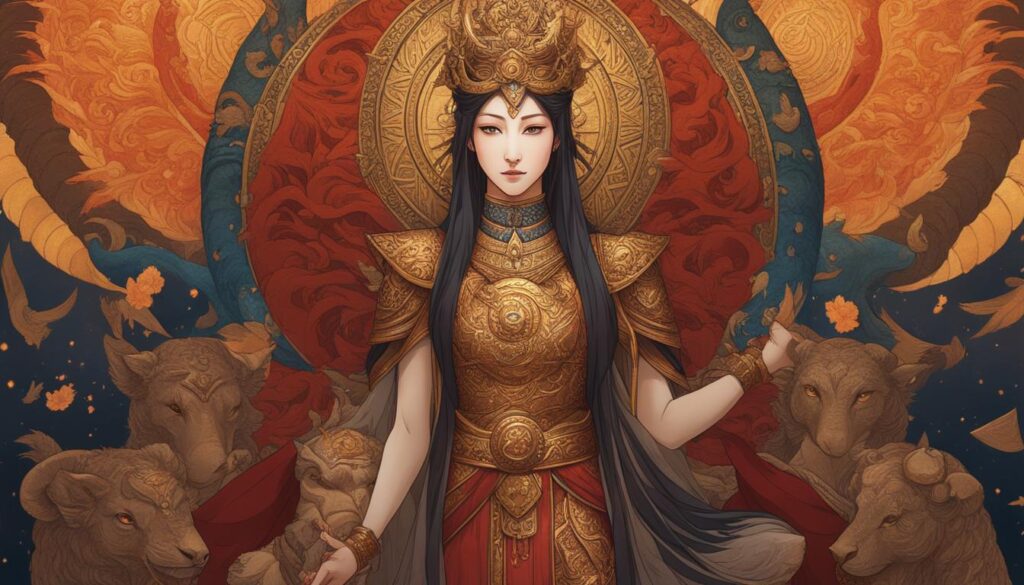In the epic poem of Gilgamesh, Ninsun, the mother of Gilgamesh, plays a significant role in interpreting her son’s dreams. Her interpretations provide valuable insights and guidance, helping Gilgamesh decipher the hidden meanings in his dreams and guiding him on his heroic quests. Ninsun’s interpretations shape Gilgamesh’s journey and contribute to the overall symbolism and significance of his dreams.
Key Takeaways:
- Gilgamesh’s mother, Ninsun, plays a vital role in interpreting his dreams.
- Ninsun’s interpretations offer valuable guidance and insights to Gilgamesh.
- Her interpretations contribute to the symbolism and significance of Gilgamesh’s dreams.
- Ninsun’s role as a divine maternal figure shapes Gilgamesh’s heroic quests.
- The epic of Gilgamesh highlights the importance of dreams and their interpretation.
The Mythical Origins of Ninsun Goddess
Ninsun, the Mesopotamian goddess, holds a significant place in ancient mythology. She is believed to have been born from the union of the sky god Anu and the earth goddess Uras, granting her divine qualities and a unique status within the pantheon of Mesopotamian deities. As the mother of Gilgamesh, Ninsun plays a pivotal role in his life, offering guidance, wisdom, and support. Her mythical origins and divine lineage position her as a figure of reverence and maternal protection.
Ninsun’s importance is further emphasized by her association with other prominent figures in Mesopotamian mythology. She is the wife of Lugalbanda, a legendary king who is considered the father of Gilgamesh. This familial connection highlights her esteemed position in society and her role as the maternal figure in Gilgamesh’s life. Additionally, Ninsun is associated with Gula, the goddess of medicine, further solidifying her divine associations and significance.
In Mesopotamian culture, Ninsun was revered as the maternal divinity, representing unconditional love, protection, and guidance. Her ability to interpret dreams proved invaluable in guiding Gilgamesh on his heroic quests. Ninsun’s mythical origins, divine lineage, and maternal divinity all contribute to her role as a powerful and revered goddess in ancient Mesopotamian society.
Ninsun’s Role in the Epic of Gilgamesh
In the epic poem of Gilgamesh, Ninsun’s role as the mother of Gilgamesh is of utmost importance. She embodies the divine maternal figure, offering unwavering love, protection, and guidance to her son. One of Ninsun’s notable contributions is her remarkable ability for dream interpretation. Her interpretations serve as a compass for Gilgamesh, helping him navigate the hidden meanings within his dreams and chart his heroic quests.
An example of Ninsun’s guidance through dream interpretation can be seen in her analysis of Gilgamesh’s dream about a falling meteor. She interprets it as a sign that a powerful companion will enter Gilgamesh’s life. This prediction comes to fruition when Enkidu, a wild man, arrives and forms a deep bond with Gilgamesh. Ninsun’s intuitive understanding of dream symbolism connects the celestial imagery of the falling meteor to the arrival of Enkidu, highlighting her role as a wise and insightful figure in Gilgamesh’s journey.
“Fear not, my son, the falling meteor from the sky. It is a sign of great significance. A powerful companion shall stand by your side, ready to aid you in your quests,” Ninsun proclaimed, her voice filled with maternal reassurance.
Moreover, Ninsun’s compassion extends beyond her own family as she embraces Enkidu as a member of their household. Her acceptance of Enkidu as an equal goes against societal norms and demonstrates her belief in fairness and empathy. Ninsun’s acceptance not only strengthens the bond between Gilgamesh and Enkidu but also sets the stage for their shared adventures and the transformative impact they have on each other’s lives.
The Role of Ninsun
- Interpreting Gilgamesh’s dreams
- Guiding Gilgamesh on his heroic quests
- Embracing Enkidu as a member of their family
- Promoting equality and empathy
In summary, Ninsun’s role in the epic of Gilgamesh is multifaceted. As a divine maternal figure, she offers love, protection, and guidance to her son, Gilgamesh. Through her exceptional ability in dream interpretation, she provides invaluable insights that shape Gilgamesh’s journey and highlight the significance of dreams in the narrative. Ninsun’s acceptance of Enkidu and her promotion of equality further exemplify her compassion and wisdom, making her a crucial character in the epic tale.

Ninsun’s Divine Family and Associations
Ninsun, the revered Mesopotamian goddess and mother of Gilgamesh, belonged to a distinguished divine family and had various significant associations in ancient mythology. Lugalbanda, the legendary king and husband of Ninsun, held a prominent place in Mesopotamian folklore and was considered the father of Gilgamesh. This familial connection added to Ninsun’s esteemed position in society and emphasized her role as a revered goddess and maternal figure.
Furthermore, Ninsun’s association with Gula, the revered goddess of medicine, showcased her connection to important concepts and figures in mythology. Gula played a vital role in healing and maintaining the well-being of the people, aligning her with Ninsun’s nurturing and protective nature. This association added depth and significance to Ninsun’s role as a divine figure and further solidified her position in the ancient Mesopotamian pantheon.
| Divine Family | Associations |
|---|---|
| Lugalbanda – Husband | Gula – Goddess of medicine |
In addition to her divine family and associations, Ninsun’s role as the mother of Gilgamesh played a vital part in shaping the narrative of the epic. Her wisdom, guidance, and interpretations of Gilgamesh’s dreams contributed to his heroic quests and the overall symbolism of his journey. Ninsun’s divine lineage and her connections to important figures and concepts in mythology further showcased her significance in ancient Mesopotamian society.
Analysis:
“Ninsun’s divine family and associations highlight her esteemed position in ancient Mesopotamian society and her role as a revered goddess. The connection to Lugalbanda and Gula further solidifies her significance and add depth to her character. These familial ties and associations contribute to the overall narrative of the epic, shaping the journey of Gilgamesh and emphasizing the importance of Ninsun’s guidance.”
Conclusion
The interpretation of Gilgamesh’s dreams by his mother, Ninsun, holds significant symbolism and serves as a guiding force in his epic journey. Ninsun’s interpretations provide valuable insights into the hidden meanings of Gilgamesh’s dreams, allowing him to understand the depths of his subconscious and embark on his heroic quests with newfound clarity.
By unraveling the symbolism in Gilgamesh’s dreams, Ninsun shapes the narrative and highlights the importance of dreams in the epic of Gilgamesh. These dreams hold profound significance, representing the inner desires, fears, and aspirations of the hero. Ninsun’s ability to decipher these symbols unveils essential messages and propels Gilgamesh towards self-discovery and personal growth.
Ninsun’s role as the divine maternal figure adds depth and emotional resonance to the story. Her unwavering love, guidance, and acceptance create a nurturing environment for Gilgamesh to thrive. Through her interpretations, Ninsun not only empowers Gilgamesh but also instills in him the importance of introspection, introspection that ultimately shapes his heroic destiny.
Exploring the Significance
The significance of Ninsun’s interpretations goes beyond the realm of dreams. Her guidance and wisdom extend to the core themes of the epic, such as the pursuit of immortality and the inherent struggles of mankind. Ninsun’s maternal influence humanizes Gilgamesh, making him relatable and reminding readers of the universal experiences and emotions we all share.
In conclusion, Ninsun’s interpretations of Gilgamesh’s dreams play a pivotal role in the epic of Gilgamesh. They provide invaluable insights into the hero’s subconscious, shaping his journey, and highlighting the significance of dreams in understanding oneself and navigating life’s challenges. Ninsun’s maternal love and wisdom guide Gilgamesh towards self-discovery, allowing him to transcend his mortal limitations and embark on a truly epic quest.
FAQ
What role does Ninsun play in the interpretation of Gilgamesh’s dreams?
Ninsun, as Gilgamesh’s mother, plays a significant role in interpreting his dreams. Her interpretations provide valuable insights and guidance, helping Gilgamesh decipher the hidden meanings in his dreams and guiding him on his heroic quests.
What is the significance of Ninsun’s role as a maternal figure in the epic of Gilgamesh?
Ninsun represents the divine maternal figure, offering unconditional love, protection, and guidance to Gilgamesh. Her role showcases the importance of motherly support and sets the stage for the bond between Gilgamesh and Enkidu, leading to their shared adventures.
Who is Ninsun associated with in Mesopotamian mythology?
Ninsun is associated with Lugalbanda, the legendary king and husband, and Gula, the revered goddess of medicine. These associations highlight Ninsun’s esteemed position in ancient Mesopotamian society and her connections to important figures and concepts in mythology.
How do Ninsun’s interpretations of Gilgamesh’s dreams contribute to the overall significance of his quest?
Ninsun’s interpretations shape Gilgamesh’s journey and contribute to the symbolism and significance of his dreams. Her ability to decipher hidden meanings and provide guidance adds depth and meaning to Gilgamesh’s quest in the epic poem.




